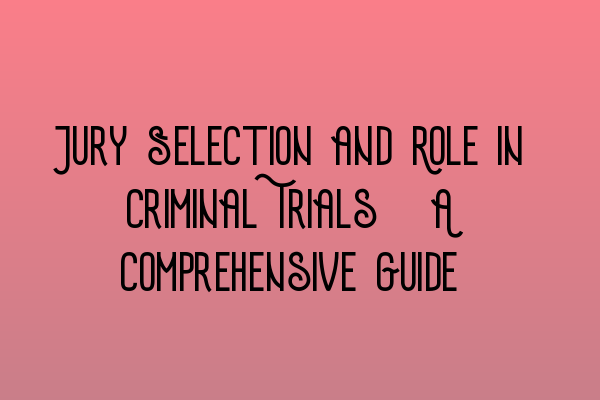Jury Selection and Role in Criminal Trials: A Comprehensive Guide
Welcome to our blog, where we provide valuable insights and information on various aspects of criminal practice in the UK. In this comprehensive guide, we will delve into the topic of jury selection and their role in criminal trials. A fair and impartial jury is crucial for ensuring justice in the criminal justice system, and understanding the jury selection process is essential for legal professionals.
The Importance of Jury Selection
The selection of a jury plays a significant role in criminal trials. It is the process where potential jurors are chosen from a pool of eligible individuals. The goal is to create an unbiased jury that can fairly assess the evidence presented and make an informed decision.
Effective jury selection involves careful consideration of various factors such as demographics, attitudes, and experiences. Criminal defense lawyers and prosecutors aim to select jurors who are open-minded, impartial, and capable of analyzing the evidence objectively.
The Jury Selection Process
The jury selection process typically involves several stages:
- Eligibility: Individuals who meet the eligibility criteria, such as age and citizenship requirements, are included in the jury pool.
- Questionnaire: Jurors are often required to complete a questionnaire to provide basic information about themselves and their background. This helps the legal teams assess any potential biases or conflicts of interest.
- Voir Dire: During this stage, the lawyers have the opportunity to question potential jurors to determine their suitability for the case. They may ask about personal beliefs, experiences, or any factors that could influence their judgment.
- Challenges: Both the defense and prosecution have the right to challenge potential jurors. There are two types of challenges – for cause and peremptory challenges. Challenges for cause can be made if the juror demonstrates bias, while peremptory challenges can be made without stating a specific reason.
- Jury Selection: After the challenges, the final jury panel is selected from the remaining potential jurors. The selected individuals will then proceed to serve as jurors in the trial.
The Role of the Jury in Criminal Trials
Juries play a critical role in criminal trials. They are responsible for evaluating the evidence presented, applying the law as instructed by the judge, and ultimately reaching a verdict. Their role is to determine whether the accused is guilty or not guilty based on the evidence and the legal standards provided.
In the UK, the jury is comprised of 12 members in most criminal trials, and their decision must be unanimous. They listen to the arguments of the prosecution and defense, review the evidence, and deliberate to reach a verdict. Their verdict should be based solely on the evidence presented in court, and they should not be influenced by any external factors.
It is important to note that jury trials are only available for certain criminal offenses. In some cases, both parties may agree to a bench trial, where the judge alone decides the verdict.
Conclusion
Jury selection and their role in criminal trials are vital components of the UK’s criminal justice system. Understanding the process and the responsibilities of jurors ensures a fair trial and upholds the principles of justice.
At SQE Criminal Law & Practice Law UK, we are committed to providing in-depth knowledge and guidance for legal professionals. If you’re interested in expanding your expertise, we recommend checking out our Workshops and Seminars on Criminal Practice to enhance your skills.
Stay updated with the latest developments in criminal laws by reading our article on Updates in UK Criminal Laws: Staying Informed and Prepared. If you’re studying for the SQE Criminal Law exam, you can enhance your study group experience by following our tips in our article Enhancing Your SQE Criminal Law Study Group Experience.
For a detailed analysis of criminal evidence rules, we recommend you dive into our article on Decoding Criminal Evidence Rules: A Detailed Analysis. Furthermore, if you’re interested in fraud and financial crimes in the UK, you can explore our article Deep Dive into Fraud and Financial Crimes in the UK.
Thank you for reading our comprehensive guide on jury selection and the role they play in criminal trials. We hope you found this information valuable and informative. Feel free to explore our website for more resources to expand your knowledge in criminal practice.
